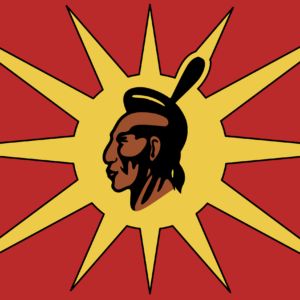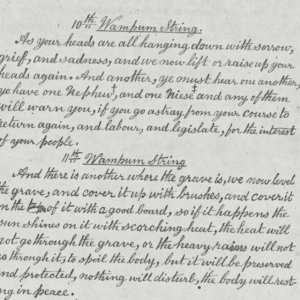I am a terrible marksman, but I am passionate about hunting. Last year I shot a young doe and was excited to provide meat for my family that was free from steroids and other chemicals and additives. I was hunting with my buddy Stan who also got two deers and he usually helps me hang the deer up a tree and skin it. I’ve also learned to butcher the meat myself through his teachings and we try to get a few Oskenno:ton each year. It is our code of honor to help each other process the meat and then split it up amongst those who took part in the hunt.
When it came time to skin and butcher the three deer I was struggling with strep throat and a fever that left me very weak in bed. Stan called me up and was wondering where I was but I had to tell him that I couldn’t make and was very sorry. It wasn’t a matter of character, I was just physically unable to stand and I hope that history didn’t remember my actions as just lazy or weak willed. In the end the work got done without me and a few days later 50 lbs. of meat was dropped off in plastic bags that I put in the freezer and my family ate. I appreciated it very much and still think of that story from time to time.
Last week when sifting through internet stories for my column I came across a picture of a Hollywood Indian with these words written on it: “Native Americans: Should have fought harder, you pussies”. It was obviously meant to insult and troll people in that special internet style. I think this single meme captures a convenient worldview that permeates North American consciousness: that the “Indian’s” lost the war and then lost their land.
The question I would ask is:
“What war in particular did we actually lose?”
In particular it is also worth identifying which specific [tweetable]“Indians” [/tweetable] are you talking about because there are at least 630 different groups of them in the lands now known as Canada.
Before the treaty relationship between England and the Haudenosaunee was defined in 1677 the colonial authorities assessed the combined military strength of the eastern indigenous nations and concluded that defeating the Haudenosaunee in war was completely impossible. [tweetable]It was then in the best interests for England to make treaties with the sovereign nations[/tweetable] of this land to secure a relationship so that other European countries such as France and Spain would not enter the picture and complicate matters.
What happened next set the stage for the condition we are currently in here at Ouse, Grand River. [tweetable]A horrible epidemic of catastrophic proportions swept like wildfire across North America.[/tweetable] Historian and Anthropologist Dr. Henry F. Dobyns concluded that 80-100 million indigenous peoples died to diseases introduced by European explorers effectively reducing the population of planet earth by 20%. It was an ‘end-times’ scenario for the Haudenosaunee. Because the Americas did not have pigs, cows or horses diseases such as smallpox was able to annihilate families, villages and entire nations of indigenous people who had no immunity to these virulent strains. By the 18th century the honeymoon stage was over and the relationship between the Haudenosaunee and England was completely deteriorated. Land seemed free for the taking and the previously undefeatable eastern nations who once influenced lives from Manhattan to the Mississippi were too weak to respond to threats of incursion and squatting.
[tweetable]When looking over these facts it becomes apparent that the war we supposedly lost has actually just begun [/tweetable] and it is not one involving muskets and tomahawks but the deadly stroke of the pen. It is a war over identity and definition. It is a war over history and popular opinion. It is a war of the mind. After 300 years of anguish it seems that we have made it through the ‘bottle-neck’ of adversity and if we were going to be extinguish or exterminated it would have happened by now.I expect to see prophecies fulfilled as the resurgent flood of indigenous language, culture and population affects our colonial guests, Canada and the United States in prolific ways. The English immigrants didn’t bring us venison while we were sick, in fact they took advantage of our weakness for their own gain but if justice can be applied there is hope that our two people groups can reconcile our relationship and begin living together in harmony the way we were meant to.







Well written and thoughtful article.
Harmony is much appreciated and reconciliation is happening today thanks to articles like this and public events such as the Hudson River Two Row Wampum canoe trip to the UN